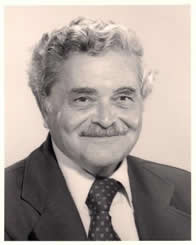

|

|
IN MEMORIAM
Joseph Frisch
Professor of Mechanical Engineering, Emeritus
UC Berkeley
1921 – 2008
Joseph Frisch, professor emeritus of mechanical engineering and pioneer in computer-aided design and manufacturing at the University of California, Berkeley, died peacefully June 15, 2008, at his home in Berkeley after a prolonged illness. Joe, as he was known to his colleagues in engineering and on the campus, was born April 21, 1921, in Vienna, Austria, the youngest son of Abraham and Rachel (Liebermann) Frisch. He came to America, escaping from the Nazis in 1938 from Vienna, through Cologne, and eventually to Amsterdam, when he and a school friend were smuggled over the German-Dutch border by the Dutch underground in the dead of night, carrying nothing more than his school bag. He immigrated to the United States, sailing from Rotterdam on the SS Veendam II, arriving in the United States the evening of February 5, 1940.
The story of his arrival in the United States, on one of the last ships carrying refugees to America at the beginning of World War II, came in part from his willingness to act as an escort for six younger Jewish children who were being evacuated to their families in America or who had been orphaned and were to be cared for by the Hebrew Immigrant Aid Society. Joe was singularly proud of his role in helping these children escape to America. This care of younger individuals was an indication of the dedication he was to show to education at Berkeley. Arriving in Hoboken, New Jersey, he joined other members of his family and worked as a mechanic and draftsman in factories in New England to save enough money to undertake university studies. He eventually enrolled at Duke University in North Carolina, where he belonged to the scientific and engineering honor societies, and where he received a degree in mechanical engineering, Phi Beta Kappa. He became a U.S. citizen in 1946.
Joe worked briefly in Baltimore, and then went west again, joining the faculty in mechanical design at UC Berkeley in 1947 as a lecturer. He earned an M.S. in mechanical engineering in 1950, became an assistant professor in 1951, an associate professor in 1957, and professor in 1963. During his long tenure at the University of California, he served as chairman of the Division of Mechanical Design (1966-1970) and as associate dean of the College of Engineering (1972-1975), and was the A. E. Taylor Distinguished Professor of Mechanical Engineering at the University of Birmingham in England, before gradually retiring in the late 1980s. While associate dean, Professor Frisch actively worked to recruit and encourage more women to enter the engineering field and traveled throughout California pursuing this goal. He taught mechanical design courses to undergraduate and graduate students in the department.
At Berkeley, his research activities centered on design and manufacturing, and he pioneered the application of computer control to manufacturing processes, such as metal cutting. Working with colleagues in mechanical engineering, he developed techniques for creating complex dies and tooling for metal forming experiments. Professor Frisch's laboratory was one of the first in the United States to investigate direct numerical control in manufacturing and design, a way to network multiple computer-controlled machine tools.
Professor Frisch’s career at Berkeley included substantial consulting and research for the Atomic Energy Commission, the aerospace industry, and NASA, where he contributed his knowledge of materials and design to nuclear energy issues, modern aircraft design, and space missions including the lunar landings.
He was a fellow of the American Society of Mechanical Engineers.
In later life, Professor Frisch turned to his many hobbies and passions. He occasionally observed that his interest in mechanical design was probably due to the fact that of the engineering disciplines, it was the bridge between the practical beauty of engineering and the ethereal beauty of the art he so loved to create. He was a lifelong artist, painting in watercolors, oils, and acrylics, and was a member of the University’s Humanities Club as well as of an informal “coffee club” that met daily at a Northside coffee shop.
He is survived by his wife of 46 years, Joan, a daughter Teri of New York City and Long Beach, California, and sons Erich of Berkeley, and Jonathan of Albany, California.
David A. Dornfeld
David M. Auslander